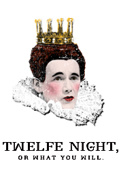Director Tim Carroll on Making 17th Century-Style Theatrical Magic in Twelfth Night and Richard III
Most directors wouldn’t be happy staging Shakespeare with the limitations imposed by the original Globe Theatre, circa 1600: men playing women; minimal scenery; performances lit by candlelight. Tim Carroll, who spent six years as associate director at London’s re-creation of the Globe, came to embrace the magic in what he calls “looking back to go forwards.” In addition to his Olivier Award-winning work at the Globe, Carroll has staged operas around the world and taught master classes in verse at NYU. The talented director is currently helming the Broadway transfer of his acclaimed productions of Twelfth Night and Richard III, with two-time Tony winner Mark Rylance leading an all-male company in rep at the Belasco Theatre. Broadway.com asked Carroll to analyze the appeal of doing more with less, as Shakespeare’s actors did more than 400 years ago.
![]()
American-born actor and director Sam Wanamaker dreamed of re-creating Shakespeare’s Globe on the banks of the Thames. After a quarter of a century of struggle, he lived only long enough to see building work begun, but at least he died knowing the Globe would be built.
Why was Wanamaker so passionate about this quixotic project? He certainly wasn’t motivated by nostalgia or any sentimental desire to create an Olde Worlde theme park; rather, he had an actor’s instinct about the plays he loved most. If we could only perform the plays in something like their original conditions, he argued, we should surely learn something about their true nature. It is in the spirit of that quest that we have brought Twelfth Night and Richard III to New York.
Twelfth Night was my fourth show at the Globe, but my first encounter with Original Practices. Might not an Elizabethan production be a bit too predictable and safe, I wondered? How wrong I was. From my first meeting with designer Jenny Tiramani, I realized that all my ideas of what a “period” production would look like were hopelessly conventional. In going back to how the Elizabethans actually made, and wore, their clothes, she creates a world which is thrillingly unfamiliar and yet undeniably real.
The actors felt this as soon as they put their costumes on: Everything about the way they walked and stood changed. And I will never forget the day the actors met the Tudor Group, a modern English family who live as Elizabethans. As they talked to the actors about life at the turn of the 17th century, and taught them some of the skills Shakespeare’s actors would have grown up with (such as how to bow, how to draw a sword, how to dance and so on), you could feel the air in the room changing as each actor had his imagination blown open and a new world of possibilities opened up. It must have been the kind of moment Sam Wanamaker had in mind.
When we played in the Globe, we had several more such moments. For example, because the twins in Twelfth Night were both played by boys, they really were indistinguishable. I cherish the moment, one night, when Sebastian entered in Act Five and, for the first time, the twins were on stage together. Behind me, someone whispered to her neighbor: “You see? I told you there were two of them!” And the Globe itself, where daylight means the actors can really talk to the audience, taught us that soliloquies are not private and inward but real conversations.
When we moved to the West End, the question immediately arose: How could we be true to an Original Practices vision in a theater with a roof? The answer lay in the very first recorded performance of Twelfth Night, at Middle Temple Hall in 1602. Shakespeare’s company were often invited to play in such halls, so we had a precedent to follow. They would have played in the afternoon, with candlelight to augment the light through the windows; and the sun would have started to sink as the play went on. As in the Globe, there would be no set; our audience, like Shakespeare’s, would have to listen to the words. We only know that we are on the seashore, or that it is past midnight, because the words tell us. All is left to the power of the imagination
This doesn’t mean that we don’t provide a visual treat: I think I have never seen a more beautiful stage picture than our oak screen with a company of actors dancing in front of it. And the richness of the language is matched not only by the clothing, but by the wonderful music of the period, by such composers as the great John Dowland, which Claire van Kampen has brought to life with such skill and care.
For me, Original Practices has meant looking back to go forwards. I have learned so much about the plays and how they work, and I feel blessed indeed to be bringing this work, performed by the best company of actors I’ve ever encountered, to the beautiful Belasco Theatre.
